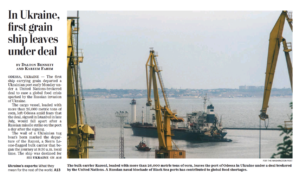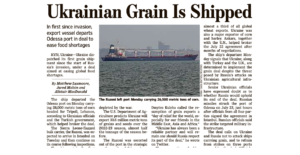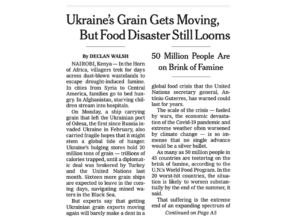As a result of the attack on Iran, nitrogen fertilizer at the port of New Orleans has seen an increase in price this week. Urea prices for barges in New…
Ukraine Grain Shipped, But Global Hunger Still Looms
Dalton Bennett and Kareem Fahim reported on the front page of today’s Washington Post that, “The first ship carrying grain departed a Ukrainian port early Monday under a United Nations-brokered deal to ease a global food crisis sparked by the Russian invasion of Ukraine.”

Today’s article noted that, “With more than 20 million tons of grain from last year’s harvest stuck in storage, the resumption of shipments by sea has been a top priority for the Ukrainian government. But Russia’s blockade has forced grain sellers to use alternatives, including river ports or costly overland routes, that have delayed deliveries.
“The July 22 agreement signed in Turkey guarantees the safe passage of commercial ships from Odessa and two other Ukrainian ports. Set to remain in force for 120 days, it relies on monitoring of designated maritime corridors by delegations from Ukraine, Russia, Turkey and the United Nations in Istanbul.”
Matthew Luxmoore, Jared Malsin and Alistair MacDonald reported in today’s Wall Street Journal that, “The resumption of shipments offers hopes of crucial income to Ukraine as its economy buckles under the weight of Russia’s invasion. Farming accounted for over 40% of Ukrainian exports before the war and employs 14% of the country’s population, according to the U.S. Department of Agriculture. It could offer a lifeline to Ukraine’s embattled farmers, granting them hard cash with which to buy the seeds, fuel and fertilizer they need to sow their next crops and ensure their survival.”

Today’s Journal article pointed out that, “On Monday, the prices of wheat and corn fell 1.6% and 2.1%, respectively, as among other factors market participants anticipated higher supplies of Ukrainian grains.
“Global wheat prices had already fallen significantly in recent weeks from the record highs they hit following Russia’s invasion, and are now close to their prewar levels. But wheat remains more than double the price it was five years ago and roughly as expensive as it was in late 2010 and early 2011, when high food prices helped spark the Middle East uprisings known as the Arab Spring.”
Also this week, David Harrison reported in Monday’s Wall Street Journal that, “Falling prices for commodities such as wheat or corn are set to slow consumer food price increases, easing pressure on a major driver of global inflation.
“But economists warn it is too soon to declare victory. Agricultural markets remain volatile and the continuing war in Ukraine, combined with unusually hot and dry weather in Europe and parts of the U.S., could bring new disruptions to food supplies.
“‘We’ll see certainly in the short run adjustments in prices,’ said Rob Vos, an economist at the International Food Policy Research Institute. ‘I would be very cautious in making big projections that things are stabilizing and getting better because we still are in a pretty difficult and tight situation.'”
And Declan Walsh reported on the front page of today’s New York Times that, “On Monday, a ship carrying grain that left the Ukrainian port of Odesa, the first since Russia invaded Ukraine in February, also carried fragile hopes that it might stem a global tide of hunger.

“Ukraine’s bulging stores hold 20 million tons of grain — trillions of calories trapped, until a diplomatic deal was brokered by Turkey and the U.N. last month. Another 16 grain ships are expected to leave in the coming days, navigating mined waters in the Black Sea.
But experts say that getting Ukrainian grain exports moving again will barely make a dent in a global food crisis that the United Nations secretary general, António Guterres, has warned could last for years.
Walsh explained that, “The scale of the crisis — fueled by wars, the economic devastation of the Covid-19 pandemic and extreme weather often worsened by climate change — is so immense that no single advance would be a silver bullet.
“As many as 50 million people in 45 countries are teetering on the brink of famine, according to the U.N.’s World Food Program. In the 20 worst-hit countries, the situation is likely to worsen substantially by the end of the summer, it said.”
Elsewhere, Bloomberg writers Kateryna Choursina, Aine Quinn, and Annmarie Hordern reported today that, “Ukraine laid out plans to cautiously ramp up grain exports, as the first shipment since Russia’s invasion was hailed as an encouraging early step toward unblocking millions of tons of crops and easing global food prices.
The first two weeks will be treated as a trial period, with no more than three vessels a day in each direction through new safe-passage corridors established under the agreement with Russia, Turkey and the United Nations, Ukraine Infrastructure Minister Oleksandr Kubrakov told Bloomberg TV on Monday. If successful, exports could increase to as much as three million tons per month in four to six weeks’ time, he said.
The Bloomberg article noted that, “In his evening address on Monday, President Volodymyr Zelenskiy said it’s still too early to draw any conclusions about the way forward, but that Monday’s shipment can be seen as a ‘first positive signal that there is a chance to stem the unfolding global food crisis.'”
Choursina, Quinn, and Hordern added that, “‘It’s important for us to make it clear that this route is safe, and then we’ll start increasing the number of vessels,’ Kubrakov said.
“The Ukrainian Sea Ports Authority is receiving applications from ship owners to participate in caravans and working to organize their departure, it said in a Facebook posting. There is 480,000 tons of grains and oilseeds loaded on vessels in the three ports covered by the deal — Pivdennyi, Odesa and Chornomorsk.”
Also today, Reuters writers Orhan Coskun and Can Sezer reported that, “Turkey expects roughly one grain ship to leave Ukrainian ports each day as long as an agreement that ensures safe passage holds, a senior Turkish official said on Tuesday after the first wartime vessel safely departed Odesa on Monday.”
And yesterday, Reuters writer Jonathan Saul reported that, “Key arrangements including procedures for ships still need to be worked out before empty vessels can come in and pick up cargoes from Ukraine using the new grains corridor, a senior London marine insurance market official said on Monday.”
The Reuters article indicated that, “Shipping companies and the insurers that cover vessels need to be assured that the journey is secure with no threat of mines or attacks to both the ships and their crews. These are typically covered in accepted maritime practices known as standard operating procedures.
“The standard operating procedures will be finalised shortly and will then be made public, U.N. spokesman Stephane Dujarric said on Monday.”
More broadly, Reuters writer Aleksandar Vasovic reported yesterday that, “Ukraine exported 3 million tonnes of agricultural products in July, bypassing its seaports, most which have been blocked by Russia, the Ukrainian Club of Agrarian Business Associations (UCAB) said on Monday.
“In a statement on Facebook, the association said agricultural exports last month grew 12% from June, while grain exports rose 21% to 1.7 million tonnes.”





